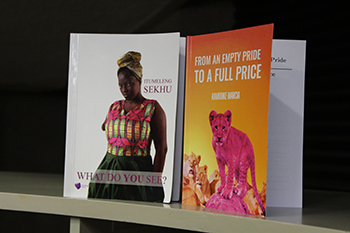Latest News Archive
Please select Category, Year, and then Month to display items
02 January 2025
|
Story Gerda-Marie van Rooyen
|
Photo Supplied
 Leading the research in South Africa is Prof Linus Franke from the Department of Soil, Crop and Climate Sciences.
Leading the research in South Africa is Prof Linus Franke from the Department of Soil, Crop and Climate Sciences.
Scientists are actively pursuing the successful breeding of diploid hybrid potatoes from inbred lines. This is expected to revolutionise potato breeding as it holds the key to rapid genetic progress. It will introduce new varieties for commercialisation through seed. Currently, existing potato variants have a gene that renders self-pollinated seeds infertile.
Prof Linus Franke, an academic in the Department of Soil, Crop and Climate Sciences at the UFS, is leading the research in South Africa. “This technology allows the production of genetically uniform potato seed that is easy to transport and largely disease-free.” He says this differs from conventional breeding whereby only vegetative propagation is possible due to tetraploid varieties in potatoes. It also risks carrying pests and diseases from one generation to the next – leading to the accumulation of pests and diseases with each round of multiplication.
Seed innovation
Prof Franke explains that Solynta BV, a seed company based in the Netherlands that produces potato varieties that can be grown from seed, has included South Africa in their research efforts because it is one of Africa’s largest producers and exporters. Through his academic relationship with Wageningen University and Research, a Dutch institution renowned for its agricultural endeavours and food production, the UFS became involved in researching hybrid potatoes grown from seed.
Diploid seeds containing two sets of chromosomes allow easier gene manipulation to increase predictability and speedier genetic progress. The breeding approach enables the incorporation of tolerance to pests, diseases, abiotic stresses (cold, heat, drought) and other desired genetic traits.
Although Prof Franke is optimistic about this research, he is not blind to disadvantages. “Potato seeds are tiny and have little energy reserves, making it harder to grow potatoes from seed than from tubers.” He says potatoes from seed will take longer to cultivate than tubers, as farmers need to grow plantlets from seeds first, adding six weeks to the growing period. “It is possible that commercial farmers can grow potatoes directly from seed. Alternatively, perhaps more likely, specialised growers will produce tubers of potatoes from seed; these tubers are then sold as seed tubers to other potato farmers, who then continue their normal practices of producing potatoes for the market from tubers.”
Financial benefits
Prof Franke says farmers have reason to get excited. “Seed potatoes will reduce input costs, as varieties with enhanced tolerance to pests and diseases require less pesticides. Planting one hectare of potatoes requires three to four tonnes of potato tubers, but only one 25 g packet of potato seeds.” Since potatoes are a more valuable commodity than maize, this technology might also increase farmers’ income potential.
UFS Library book launch programme fosters dialogue between students and authors
2017-03-30

The University of the Free State (UFS) Sasol Library has hosted a series of book launches since 2016, bringing to the Bloemfontein Campus various new and seasoned authors who share their stories with the campus audiences. The Launch Your Book at the Library Programme hosted two authors on 23 March 2017, Itumeleng Sekhu and Marcia Ramodike. Both authors spoke about their life-changing experiences and shared their heart-wrenching stories, filled with courage and hope.
“Libraries must take the lead in creating dialogue, expression of ideas and inculcating a culture of reading and writing. This programme was also established to bridge the gap and find ways to encourage students to read and write, by creating a platform where they can interact with authors and see that people who write books are ordinary people with real stories to tell,” said Marcus Maphile, Assistant Director: Library Marketing and Community Engagement.
Speaking about her book, Itumeleng Sekhu described her experiences from childhood and her life as a disabled person after being severely burnt in a fire accident in her home as a baby. She said: “I tried to commit suicide several times because I had lost hope. Eventually after failing to do so, I realised at some point that it was time for me to let my light shine through.” She wrote her book, titled What Do You See?, which has received substantial media coverage, to encourage others who live with painful experiences, disabilities and what she terms “internal wounds”, hoping that her experiences could help to heal them.
Marcia Ramodike’s book, An Empty Pride to a Full Price, paints a picture of her life as a youth grappling with adult issues. She describes her pain after her mother’s death, and her constant battle with the legacy of the difficult socio-economic conditions she grew up in. When students asked Ramodike what she thought the right time was to write a book, she responded, “today is the right time to write your story”.
The UFS Library has hosted 16 book launches since 2016, with the biggest being the launch of Zubeida Jaffer’s book Beauty of the Heart. The programme aims to provide access to information and to share and debate ideas in support of democracy and freedom of speech.